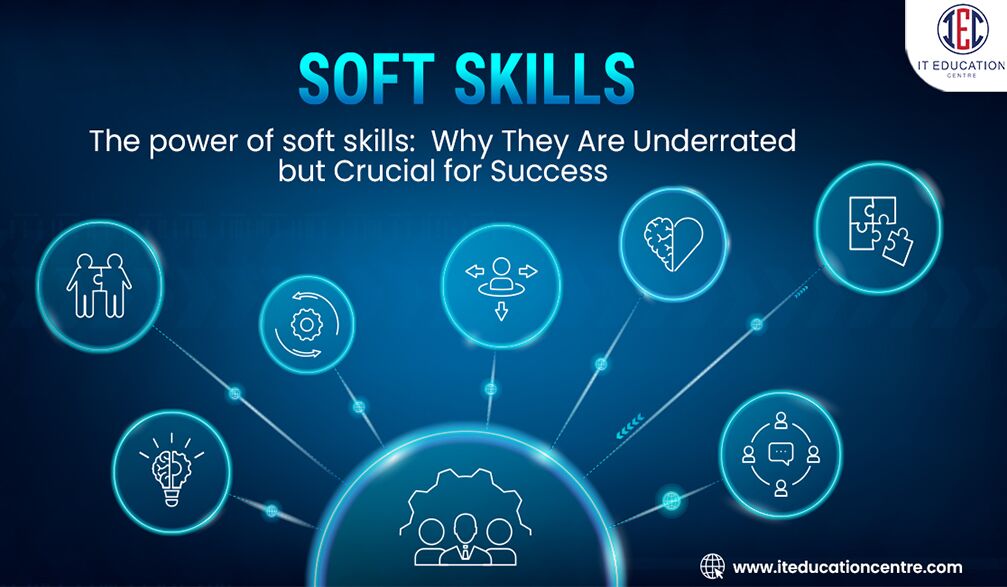The Power of Soft Skills: Why They Are Underrated but Crucial for Success.
In today’s fast-paced and technology-driven world, the spotlight often falls on hard skills, technical expertise, and academic qualifications. While these skills are undoubtedly important, there is another set of abilities that often goes unnoticed but plays an equally crucial role in personal and professional success: soft skills. Soft skills, often referred to as interpersonal or
people skills, encompass a wide range of qualities, and they are undeniably underrated in our society. In this blog post, we’ll delve into why soft skills are often overlooked, why they are essential, and how you can cultivate them to enhance your life and career.
Defining Soft Skills
Before we dive deeper, let’s clarify what soft skills are. Soft skills are personal attributes, personality traits, and social abilities that enable individuals to interact effectively with others. They are often intangible and difficult to quantify, making them less visible than hard skills like coding, accounting, or engineering. Some common soft skills include communication, empathy,
teamwork, adaptability, problem-solving, leadership, and time management.
The Underrated Nature of Soft Skills
- Not Tangible or Easily Measurable: Unlike hard skills, which can be quantified and tested, soft skills are subjective and often challenging to assess. This makes it difficult for employers to gauge a candidate’s soft skills during the hiring process, leading them to focus more on hard skills.
- Overemphasis on Technical Proficiency: In many industries, there is an overemphasis on technical proficiency and academic qualifications. Job descriptions often prioritize hard skills, leaving little room for soft skills. The misconception that They Can’t Be Learned
- Another reason soft skills are underrated is the misconception that they are innate and cannot be learned or improved. This belief discourages individuals from actively developing these skills.
Also, Read This Blog- How can you learn English
The Crucial Role of Soft Skills
Now, let’s explore why soft skills are absolutely crucial, both in the workplace and in everyday life:
- Effective Communication: Strong communication skills are essential for building relationships, resolving conflicts, and conveying ideas clearly. In the workplace, effective communication is crucial for collaboration and leadership.
- Teamwork and Collaboration: Many projects and tasks require individuals to work together. Soft skills like teamwork, empathy, and adaptability are vital for a harmonious and productive team dynamic.
- Adaptability and Problem Solving: In a rapidly changing world, adaptability and problem-solving skills are invaluable. Soft skills enable individuals to navigate uncertainty, learn quickly, and find innovative solutions.
- Leadership and Management: Successful leaders possess a strong set of soft skills, including empathy, active listening, and the ability to motivate and inspire their teams.
- Customer Relations: In customer-facing roles, soft skills like empathy, patience, and active listening can make or break a customer’s experience.
Cultivating Soft Skills
Now that we understand the importance of soft skills, here are some strategies to cultivate and
improve them:
- Practice Active Listening: Make an effort to truly listen when others speak. This demonstrates respect and empathy, and it’s a fundamental aspect of effective communication.
- Seek Feedback: Ask for feedback from peers, mentors, or supervisors to identify areas for improvement. Constructive feedback can help you hone your soft skills.
- Develop Empathy: Put yourself in others’ shoes to better understand their perspectives and emotions. This will enhance your ability to relate to and connect with people.
- Continuous Learning: Soft skills can be developed and refined over time. Attend workshops, read books, and take online courses to enhance your soft skill set.
- Practice Conflict Resolution: Learn how to address conflicts calmly and constructively.
This skill is invaluable in both personal and professional relationships.
In conclusion,
while hard skills may get you the interview, it’s your soft skills that often secure the job and enable long-term success. Soft skills are not just underrated; they are the glue that holds together teams, fosters effective communication, and propels individuals towards their goals. By recognizing their importance and actively working to cultivate them, you can enhance
your career prospects, build better relationships, and lead a more fulfilling life.
For Classes Call: 2048553006
Registration Link: Click Here!
Author:-
Yuthika Sharma
Soft Skills Trainer
IT Education Centre Placement & Training Institute
© Copyright 2023 | IT Education Centre.
